Arguably one of our most popular programs for 2017, Teaching English in Vietnam is becoming a very attractive option to a wide range of people. It offers an exceptional opportunity to work in a country whose economy is one of the fastest growing in the world and a healthy balance between good pay, comfortable accommodations and a thoroughly immersive cultural experience. I sat down to chat to Justin, a former English teacher in Vietnam who now runs his own successful videography company - he feels Vietnam was a great training ground for launching his business.
Interested in Teaching English in Vietnam? We'll send you more info!
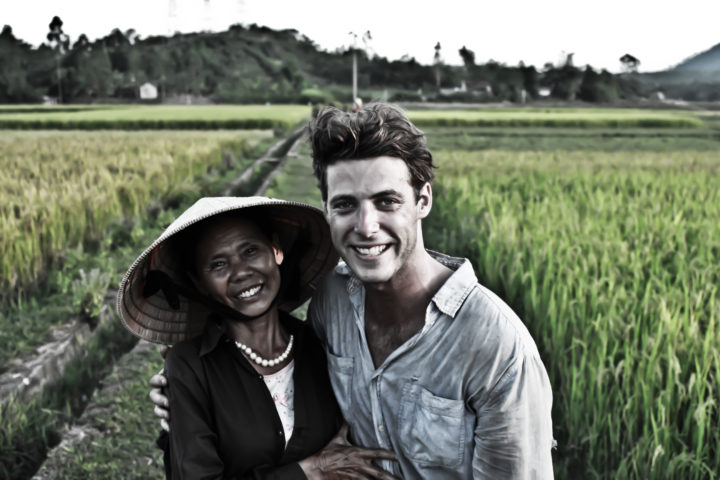 Justin loved exploring the rural parts of Vietnam. "This was a wonderfully warm lady I met in the countryside during my trip. She couldn't speak a word of english, nor I Vietnamese but somehow we connected."
Justin loved exploring the rural parts of Vietnam. "This was a wonderfully warm lady I met in the countryside during my trip. She couldn't speak a word of english, nor I Vietnamese but somehow we connected."
Nick (N): Justin, so awesome to chat to you! I know your story is one many are very keen to hear, especially with teaching in Vietnam becoming such an intriguing option for those looking to work abroad.
Justin (J): Thanks Nick, hoping my story can help inspire others to take this leap of faith into the unknown.
N: I'm sure it will, but first, tell me a little about yourself. Where are you from, what did you study and all that to allow you to get overseas?
J: Sure thing, I'm from Cape Town, South Africa and I studied a BComm in Psychology at nearby Stellenbosch University and then I also studied an extra year of film school at SAE in Cape Town.
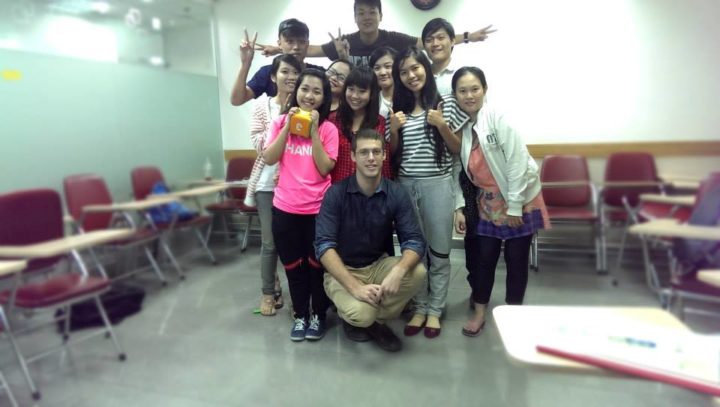 Justin's teaching time in Vietnam was spent at a language institute. Here he is with his young class.
Justin's teaching time in Vietnam was spent at a language institute. Here he is with his young class.
N: Ah that explains your videography, I was going to ask how that psychology degree helps you learn how to work your magic behind the camera! So, you taught in Vietnam, when and where in the country was that?
J: Yes, so after my degree, which I was never overly exited about, I decided I had to leave my life in Cape Town and explore new places with new cultures. For some unknown reason I was drawn to Asia. I did a course in teaching English and headed off to Vietnam to teach in 2013.
N: Wow you must have been one of the early adopters, I remember back in those days it was just teaching in Thailand and South Korea that was all the rage. What was the job like compared to Thailand?
J: Well, I haven't taught in Thailand, though I have friends who have and my job was pretty different. Thailand is all about teaching during the day at state schools. I taught at an English Institute which had students from 6 years old, all the way up to adults. My hours were only in the evening on week days and then full days on weekends with all the fun and energy sapping youngsters. These work hours gave me loads of time to explore during the week!
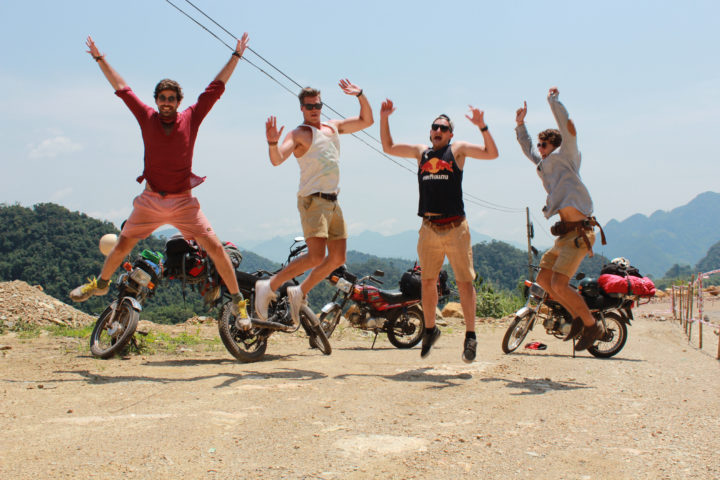 Mastering riding a motorbike will definitely get you far traveling in Vietnam. Justin and his mates did some epic bike trips!
Mastering riding a motorbike will definitely get you far traveling in Vietnam. Justin and his mates did some epic bike trips!
N: Sounds epic! Exploring is important, I mean you don't travel halfway across the globe to be chained to a desk! But I know that teaching abroad isn't all just fun and games, what did you find was the hardest part of the experience?
J: Oh definitely, but it's not like the tough stuff makes for a bad experience. I would say though, the hardest thing was communicating with the locals. Generally speaking, the English in Vietnam is poor and communication required a lot of charades and misunderstanding. For example, the one time I ordered a smoothie made from three different fruits and instead received three different smoothies of three different fruits. Or there's the time after I asked for directions that I drove right out of the city on my bike, before I realised my mistake.
N: I remember a similar incident in Vietnam where I ended up with a durian and avocado smoothie instead of mango or something. Let's just say they're not a match made in heaven! So what did you love most about being there?
J: Yeah I can't say that one would be high on my list of things to try! What did I love most? The food! Oh the food. The cost of living. The freedom of cruising on my bike. The kindness and interest of the people. There is so much to love about Vietnam.
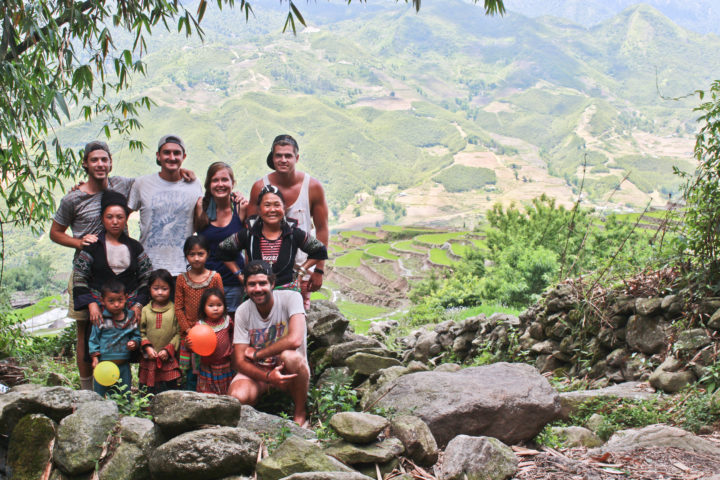 "This was the family we stayed with in Sapa. One of my favourite places I visited in all of South East Asia full of rolling mountains of rice paddies."
"This was the family we stayed with in Sapa. One of my favourite places I visited in all of South East Asia full of rolling mountains of rice paddies."
N: I hear you on that one, definitely my favourite Asian country, so far! So, everyone feels nervous about taking a leap like this, what were you most nervous about before arriving?
J: I was most nervous about teaching. I did an online course in teaching and didn’t get any practical experience, I believe now that many schools in Vietnam require you to have an in-class course which would have been better! So facilitating my first 3 hour lesson was hard. I sweated. It was awkward. Naturally, as time went on, I found myself being more comfortable in the classroom. I began to have more techniques and games in my arsenal until it became second nature.
N: Sounds like it was tough, but it's awesome to hear the positive experience you had by pushing through the hard parts. So what type of person would you say this is not for?
J: Teaching in Vietnam, or teaching abroad anywhere really, requires a person to have patience and to be flexible. Patience in challenging your own preconceptions about culture; how one should live their life and what you believe to be normal. Flexibility with the way in which every day is going to be different and plans change all the time. To answer the question, I think teaching abroad is for everyone, it depends on the type of person as to how much of a challenge or learning experience it may be.*
*Teaching English in Vietnam now requires that you hold a bachelor's degree in any field and that you hold a TESOL or equivalent certificate where the course was conducted fully in-class under supervision of an instructor.
 "While in HCMC I did a summer camp with one of the schools. I was assigned to create fun games! This is them trying to move a coke can from one table to another with some dry spaghetti."
"While in HCMC I did a summer camp with one of the schools. I was assigned to create fun games! This is them trying to move a coke can from one table to another with some dry spaghetti."
N: Wow, that's some sage advice, really well said! Thanks so much for sharing. So now I want to talk a bit about your videography. How did you get into doing this?
J: Initially, I got into videography as a means to travel. But the more I got into it, the more I loved it and the more I wanted to learn about the art of film.
N: What's your proudest video moment?
J: Hmmmmm. Probably every time I film wildlife. It so much about luck, but it also requires understanding of animal behaviour in an attempt to get the best shot.
N: Okay so you mentioned traveling for work. Where has your videography business taken you?
J: I have been fortunate enough to go to Mauritius, all around South Africa’s wildernesses, Zimbabwe and Botswana and even back to Vietnam!
N: So Vietnam is a recurring theme in your work life! What do you love about shooting in Vietnam?
J: Vietnam, and Ho Chi Minh City in particular have interesting shots no matter which direction you point your camera. There are characters on every corner, and something ‘unusual’ to see every which way. So it makes for interesting content.
N: So after seeing your work, the film geeks will be asking what equipment you shoot on.
J: Most of the time, I was using the Sony A7sii with a 50mm 1.2 for those pretty close ups, or our trusty wide lens. I often slapped the setup on an EC1 stabilizer to get that cinematic feel to it.
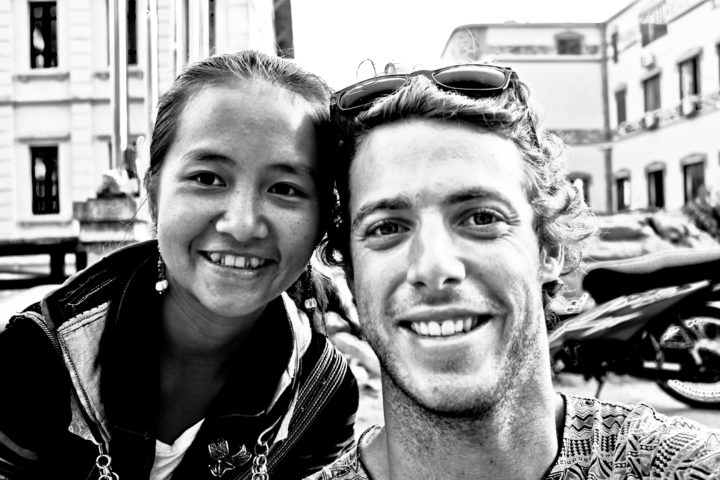 "This was a young woman I met in the town in Sapa. She was so curious about the western way of living and we traded culture for a few hours while roaming the streets."
"This was a young woman I met in the town in Sapa. She was so curious about the western way of living and we traded culture for a few hours while roaming the streets."
N: Well whatever you do, it works! For the budding videographers, what's one bit of advice you'd wished you'd had when starting out?
J: Find someone to point you in the right direction and you can dig deeper and deeper into whatever it is that interests you. All the resources you need are online. Know the film rules before you break them. Break the rules sometimes. Experiment. It’s not all about the gear. But if you need to invest in one piece of gear starting out, get a GoPro: you can take it anywhere!
N: Justin, thanks so much for all of this, it's been great chatting. One last thing, where can we see your work?
J: Just head over to our brand new website for Kelly & Woods.
Interested in Teaching English in Vietnam? We'll send you more info!
Tags:
Vietnam


